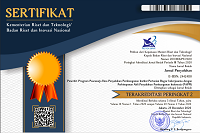Analisis Hubungan Tingkat Kerentanan Masyarakat Pesisir Terhadap Bencana dengan Upaya Pengurangan Risiko Bencana (PRB)
Abstract
Vulnerability is a level lack of ability in a society to prevent, defuse, achieve readiness and response the impact of disaster hazards. The coastal area is indicated as one of areas that vulnerable to natural disasters such as earthquake and Tsunami. Every society has different levels of vulnerability to disasters. This research has three main objectives. The First is to identify the level of vulnerability of coastal communities. The level of vulnerability has four aspects, namely; sosio-cultural, economical, environmental, and institutional. The second is to identify efforts of disaster risk reduction by coastal communities. The Third is to analyze thecorrelation beetwen the level of vulnerability of coastal communities with the efforts of disaster risk reduction. The results show that socio-cultural aspect and institutional aspect are in the lowest level of vulnerability, whereas environmental aspect can be categorized to the middle level of vulnerability. On the other hand, on economic aspect using level of walfare as an indicator, 50% respondent show the lowest level of vulnerability and the rest is the highest level of vulnerability. There is significant correlation between the level of walfare with the efforts of disaster risk reduction to implementation of housing reconstruction. This research combined the quantitative and qualitative research approach.
Keywords: vulnerability, disaster, disaster risk reduction, mitigation, construction, reconstruction
Downloads
Authors who publish with this journal agree to the following terms:
- Authors retain copyright and grant the journal right of first publication with the work simultaneously licensed under a

This work is licensed under a Creative Commons Attribution 4.0 International License that allows others to share the work with an acknowledgement of the work's authorship and initial publication in this journal. - Authors are able to enter into separate, additional contractual arrangements for the non-exclusive distribution of the journal's published version of the work (e.g., post it to an institutional repository or publish it in a book), with an acknowledgement of its initial publication in this journal.
- Authors are permitted and encouraged to post their work online (e.g., in institutional repositories or on their website) prior to and during the submission process, as it can lead to productive exchanges, as well as earlier and greater citation of published work (See The Effect of Open Access).















